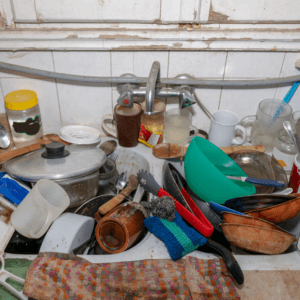Most Common Hoarder Clean Items: Your Ultimate Guide
Most Common Hoarder Clean Items: Your Ultimate Guide
Summary
In this comprehensive guide on hoarder cleaning, we explore the most common hoarder clean items and the importance of addressing hoarding disorder. We discuss the challenges of hoarding disorder, the need for proper clean-up, and list common hoarder items like newspapers, electronics, clothing, books, and more. The article outlines a step-by-step process for effective clean-up and emphasises the importance of seeking professional help in severe cases.
In this comprehensive guide, we delve into the most common hoarder clean items, shedding light on the essential aspects of tackling hoarding and ensuring the safe and healthy return of your space.
Understanding Hoarding Disorder
Before we dive into the specifics of hoarder clean items, it’s crucial to grasp the nature of hoarding disorder. Hoarding is a complex psychological condition characterised by the excessive accumulation of belongings, often leading to cluttered and unsanitary living conditions. Individuals affected by hoarding disorder find it challenging to part with possessions, which can have severe consequences on their overall well-being.
The Importance of Proper Hoarder Clean-Up
Hoarding can have significant health and safety implications, making it essential to address this issue promptly and effectively. Proper hoarder clean-up not only enhances the quality of life for those affected but also ensures a safe and habitable environment.
Common Hoarder Clean Items
We’ve compiled a list of the most common hoarder clean items to understand the level of cleaning and sorting required.
- Newspapers and Magazines
Old newspapers and magazines are often found in abundance in hoarded spaces. Hoarders tend to hold onto these items due to sentimental value or the belief that they might need them in the future. Cleaning up newspapers and magazines requires meticulous sorting and recycling to declutter the space.
- Broken Electronics
Non-functional electronic devices and appliances are another common hoarder clean item. Hoarders often store these items, hoping to repair them someday. Proper disposal or recycling of broken electronics is crucial to free up space and ensure safety.
- Clothing and Accessories
Excessive clothing and accessories can take up a significant portion of hoarded spaces. Sorting through clothing items, donating what’s in good condition, and discarding the rest is essential for efficient clean-up.
- Books
Books are often cherished possessions, making it challenging for hoarders to part with them. Cleaning up a hoarded space involves categorising books and deciding which ones to keep, donate, or sell.
- Furniture and Household Items
Hoarders may accumulate furniture and household items, even if they no longer serve any functional purpose. Disposing of unnecessary furniture and items is crucial for creating a clutter-free environment.
- Food Items
Expired or spoiled food items are a common hoarder clean item that poses health risks. Cleaning up includes removing expired food and ensuring that the kitchen and pantry are sanitary.
- Empty Containers
Hoarders often keep empty containers, such as boxes and jars, believing they might need them later. Discarding these containers is essential to reduce clutter.
- Collectibles and Memorabilia
Collectibles and memorabilia hold sentimental value for hoarders. Cleaning up involves carefully organising and preserving these items while decluttering the space.
The Process of Hoarder Clean-Up
To effectively tackle a hoarding clean, multiple steps must be taken to ensure a complete process.
Assessment: Begin by assessing the extent of hoarding and categorising items based on their importance and condition.
Create a Plan: Develop a comprehensive plan for cleaning up the hoarded space, including setting realistic goals and timelines.
Sorting and Decluttering: Systematically sort through hoarded items, deciding what to keep, donate, recycle, or discard.
Cleaning and Sanitising: Thoroughly clean and sanitise the space, addressing any health and safety hazards.
Seek Professional Help: In severe cases of hoarding disorder, consider involving mental health professionals to provide support and guidance.
In conclusion, hoarding is a complex issue that requires compassion, understanding, and a systematic approach to clean-up. By addressing the most common hoarder clean items and outlining the clean-up process, you can ensure the return of a safe and healthy space.
FAQs
What is hoarder cleaning, and why is it necessary?
Hoarder cleaning is the process of cleaning and decluttering a space that has been affected by hoarding disorder. It is necessary for several reasons. Hoarding can lead to unsafe and unsanitary living conditions, posing health risks to the individuals involved. Cleaning up a hoarded space is essential to ensure the safety and well-being of the affected individuals and to restore the living environment to a habitable condition.
Can I clean up a hoarded space on my own, or do I need professional help?
The extent and severity of hoarding can vary greatly. In some cases, minor clutter can be managed by individuals or their family members. However, in severe cases of hoarding disorder, it is highly recommended to seek professional help. Professional hoarder cleaning services have the expertise, experience, and resources to handle complex hoarding situations safely and effectively.
Is hoarder cleaning a one-time process, or does it require ongoing maintenance?
Hoarder cleaning is often an ongoing process. While the initial clean-up is crucial to removing clutter and restoring a safe living environment, it’s essential to recognise that hoarding disorder is a complex condition that may require long-term support.
Why Choose AllAces?
AllAces Cleaning & Restoration has more than 35 years of industry experience, handling extensive hoarder cleaning jobs across Brisbane, Sydney, Melbourne, and surrounds. Our IICRC-certified technicians are highly trained and qualified to ensure the safe and healthy return of any space.



